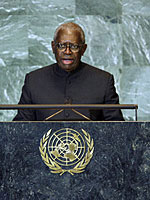Suriname
H. E. Mr. Runaldo Ronald Venetiaan, President
24 September 2008
- Video: English [RealPlayer - 11 min]
- Statement: English [PDF]
- Back to the list of speakers
Statement Summary

© UN Photo
Click for caption and to enlarge
RUNALDO RONALD VENETIAAN, President of Suriname, said that, even as the United Nations celebrated the sixtieth anniversary of the Universal Declaration of Human Rights, many of those rights were under serious pressure. Emerging challenges such as global warming, climate change, and the global food and energy crises were infringing on people’s rights to food, health, education, security and the overall freedom to live in dignity. Those intertwined threats were beyond the control of any single nation. Millions of vulnerable people were, therefore, looking to the international community, with the United Nations at the helm, for effective relief.
To meet those challenges, he continued, the world’s combined efforts should be intensified. Suriname supported the emergency global partnership plan for Food, established by Secretary-General Ban Ki-moon. The global financial crisis also required substantial political and financial commitments from national Governments, multilateral organizations, indulging the international financial institutions, and the private sector. Individuals must also change their behaviours towards “Mother Nature”, even as Governments in the developed world modified agricultural policies that caused low agricultural production in the developing world. Lasting solutions should be sought now, or the costs of inaction would be devastating for future generations.
For its part, he said, Suriname was on the right track towards achieving the Millennium Development Goals. Due to sustained economic growth rates of over 5 per cent –- and predictions that those rates would rise to 8 per cent in the coming year -- it was reducing its levels of poverty. It had taken action to preserve that success in the face of the current food and energy crises, and the recent turmoil in the financial sector by expanding social security and calling on the private sector to restore eroded salaries and pensions.
Suriname was also committed to the promotion and protection of human rights, he said, highlighting his country’s accession to the Rome Statue of the International Criminal Court on 15 July. It recognized, however, that providing the Court with the full potential to meet its mandate required a joint commitment at the global level.
Given the magnitude of current environmental disturbances, their negative impact on the world’s resources could no longer be ignored, he said. With 90 per cent of its land covered in forest, Suriname was aware of its potential in contributing to climate change mitigation. It was further committed to conserving its biodiversity and protecting its water resources. Nevertheless, his country felt that the international community’s contribution to protecting those valuable resources should be in proportion to the sacrifice made by forested countries. To that end, Suriname had recently hosted a forum on financing for sustainable forest management, and it continued to stress the importance of finding new financing mechanisms to support forest management.
In closing, he reiterated his country’s support for the restructuring process at the United Nations. It expected that the role of the Organization as a partner in development would gain further relevance and achieve a more coherent presence in capacity-building efforts.
[Source: GA/10751]